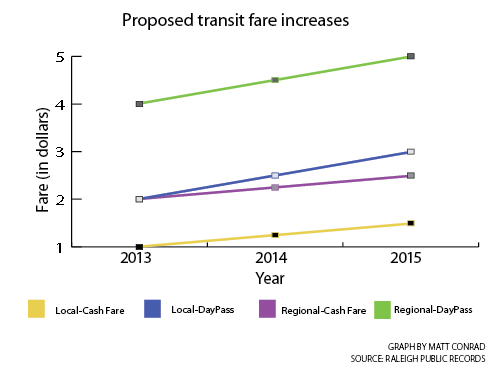Some public transportation options in Raleigh may get slightly more expensive next year.
Capital Area Transit and the Triangle Transit Authority have proposed rate increases for bus rides that would be implemented during 2014 and 2015.
“With changes to the federal transportation law last year, we, like other transit systems, will now be getting a much lower level funding available for bus purchases,” said Brad Schulz, communications officer for Triangle Transit. “The revenue from a fare increase is an important part of the financial strategy to keep our bus fleet in good working condition.”
The proposed increases could mean fares will change from $1 to $1.25 in 2014 and then again to $1.50 in 2015. Regional rides could increase from $2 to $2.25 in 2014 and then again to $2.50 in 2015. Schulz said it has been eight years since Triangle Transit established the current $2 base fare.
Schulz said Triangle Transit has been able to keep fare levels constant while modestly increasing service, through finding operating efficiencies and cut low-producing service. Triangle Transit has also frozen or limited salary increases and pursued federal grants.
“Despite all these efforts, our operating costs have increased faster than fare revenues, and federal and state grants have been flat or shrinking,” Schulz said. “That’s put increasing pressures on local revenue sources.”
Schulz said most of the costs of operating Triangle Transit’s bus service are tied to wages and benefits of bus operators, supervisors and mechanics. That includes increases in health insurance.
Fuel prices are also significant chunk of rising costs, Schulz said. Diesel prices are much higher today than eight years ago.
Schulz also said Triangle Transit needs to replace its fleet of 60 buses and 26 paratransit vehicles during the next 10 years. In the past, federal dollars were available to pay for 80 percent of the cost of vehicles, Schulz said.
Christine Klein, the public communication specialist for NCSU Transportation, said it is unclear whether or not this proposed rate increase would impact her department’s costs.
“We have a negotiated rate with both CAT and Triangle Transit,” Klein said. “We’re reviewing our ridership and budget to be prepared.”
Currently, N.C. State students have the option to ride most CAT and Triangle Transit routes for free, through the GoPass program. N.C. State faculty and staff members pay a $25 pre-paid annual fee. Klein said that the student transit fee mainly funds this program.
“GoPass helps the University meet its sustainable goals by offering alternative forms of commuting back and forth to campus, as well as around Raleigh and RTP,” Klein said. “We have approximately 19,000 parking spaces to serve students, faculty, staff and visitors. Supporting programs for alternative transportation modes helps us to provide parking spaces for those who for whatever reasons cannot use transit to commute to and from campus.”
Klein said the program started about 11 years ago. In the 2012-13 fiscal year, NCSU Transportation issued 8,546 GoPasses to students, faculty and staff members.
CAT and TTA are hosting several public meetings this month for comments about the proposed rate increase. The closest meeting location to N.C. State will be held 3:30-6:30 p.m., Nov. 14, at One Exchange Plaza in downtown Raleigh.
Schulz said Triangle Transit hopes the public will study the new fares carefully and share their thoughts at these meetings.
“In the last year, we had nearly 791,000 boardings on routes that begin or end in Raleigh — that’s 45 percent of Triangle Transit’s ridership,” Schulz said. “It’ll be important to hear from our NC State and Raleigh customers. The more comments we have, the better our staff and Board can learn what the public thinks.”
Representatives from the Raleigh Transit Authority, which runs CAT, could not be reached for comment.








